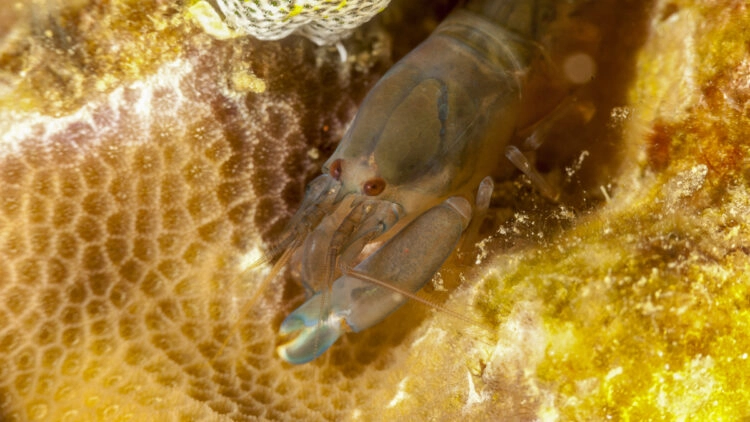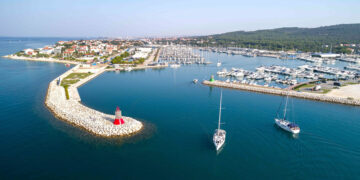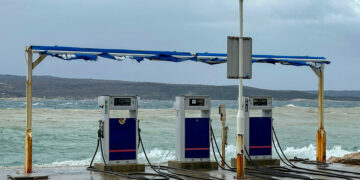It is one of the few remaining “mysteries” of the sport shipping, which apparently could not be explained yet or not sufficiently scientifically: mysterious, indefinable, mostly nocturnal noises on board bring many crews to the brink of a nervous breakdown. But what is it really that crackles, pops, rustles, tingles and cracks there on a regular basis?.
Some crews describe the sound as if someone were “nibbling” on the boat; they claim that there must be “definitely involved” shrimp, which – especially at night – tampered with the growth of the underwater hull of the yacht. Sometimes a “muffled noise” is heard, which is explained by larger fish chasing the shrimps, and carelessly “banging against the hull wall”.
Others claim that there are ducks at work (outside) or rats (inside), that the mysterious noises come from “cockroaches crawling around under the floorboards”, or that it must be “somehow related to the growth of algae and lime worms on the hull”. Mussels are also often blamed for underwater noise, especially when “moored to stone piers.”
The contributions to the discussion on the net are varied – and they are contradictory
Other skippers wonder if it might even be the microscopic plankton that could not only glow, but cause noise as well? Also noise emissions by the “surface tension of the water”, by “temperature fluctuations at the underwater ship”, “electrostatic discharges”, “at the stern breaking mini waves” or “bubble formation by water penetrating into the antifouling” (noises like “mineral water in the glass”) or “pebbles at the ground, which are moved by the water”, are seriously discussed as causes.
The contributions to the discussion on the subject of “crackling on board” in various yacht forums have been around for a long time, they are varied, and they are contradictory. After evaluating the most important ones, the only thing that seems to be certain is that there is as yet no sound scientific explanation for the mysterious noises on board, which sometimes make crews “turn the boat completely inside out” at night, remove the entire floorboards, clear out the forecastle boxes or dismantle the salon interior trim.
Suspicion of a defect in the yacht keeps many crews up at night
Also the suspicion of gassing batteries or a leak (“bubbling”), short circuits or a cable fire on board (“hissing”, “popping”, “cracking, as if electrical sparks were spraying”) and the slipping keel that has run aground – because of the strange, indefinable noises – often cause sleepless nights, which, however, can usually be definitively ruled out as the source of the noise after a check.
But the noise that so many crews know and fear remains – “This crackling cannot be localized. It seems to come from everywhere and nowhere. People will listen out for it, but it can’t be heard outside. It somehow comes from inside the ship,” writes one blogger aptly. So is the Klabautermann, the Good Spirit of every ship, at work here after all?
Not at all. In a post from 2020, the crew of the SolarWave, anchored off Igoumenitsa, for the first time seriously blamed the small pistol shrimp (snapping shrimp, also known as “pistol shrimp”) as the cause of the nocturnal disturbance of the peace: “We hear day and night a crackling on or in the hull of the boat, which seems to be particularly loud in this bay.”
The noise “like a popcorn machine” can be heard throughout the hull
The sound is an irregular loud tingling that seems to come from everywhere and nowhere, a sound that sounds like what the popcorn felt like on the roof of my mouth when I was a kid, sprinkled into my mouth with relish from little baggies. Or like a popcorn machine.
It was “a sound that can be heard everywhere in the hull; it is loudest in the bilge,” writes crew member Susanne Viczian, who concludes that this noise could only have been caused by pistol shrimp.
The pistol shrimp (Alpheidae), also called pistol shrimp, are a species-rich shrimp family that actually originate from the tropics and subtropics, but also live in temperate latitudes and even in brackish or freshwater. The name is derived from the fact that many species can make a loud noise – similar to a bang – with one of their two claws.
Pistol shrimp shoot a jet of water with an imploding cavitation bubble
How does this work? Well, actually quite simple: the shrimp emit a jet of water at lightning speed when closing their “popping scissors”, which forms a cavitation bubble (known from many conventional bow thrusters) – this then implodes and produces the sound which we interpret as “popping”.
Not sufficiently clarified seems to be in science, whether the loud noise is only a side effect, or whether it is the small shrimp actually only about the water jet, which they – in combination with the imploding bubble – as a warning, in the fight with conspecifics, when catching prey or for intra-species communication.
“Gun crabs” allegedly even disturbed the sonar of the military due to the popping sounds
Anyway, due to the loud banging noises the crabs became famous, maybe one can even say: infamous, because allegedly they even disturbed the military’s sonar detections during the Second World War by their banging noises. The fact is that the gun crabs can briefly stun small crabs, worms and small fish by the pressure. The rest is then quickly taken care of by the claws.
It is possible that increasing ocean warming can lead to an amplification and multiplication of the snapping sounds produced. While this is only a hypothesis so far, laboratory experiments showed that water temperature can affect the production of gun crab sounds; the data suggest that as water temperature increases, there is also greater acoustic activity.
“General broadband crackling”: trust is good, control is better
Conclusion: the “ubiquitous broadband crackle” of gun crabs will continue to accompany us, amplified by the hull of our yachts as an ideal resonating body. It is good to know that these are fortunately only small shrimps, and the boat – at least probably in the vast majority of cases – should not be in serious danger of burning down or sinking despite the noises (trusting in this knowledge is good, but checking in the respective situation in case of suspicious noises is better, you never know).
In this respect, we yacht travelers will probably have no choice in the future but to pay undivided attention to all initially inexplicable noises on board in order to be able to rule out any impending dangers with certainty.
Only when this is done, we should seriously consider the small pistol shrimp as the cause of the mysterious noise on board – according to the exclusion system, so to speak.
But what if finally these noisy mini shrimp can also be definitively ruled out as the source? Well, then you should slowly get used to the idea that you might have the Klabautermann on board after all.
YouTube Video: “The Pistolshrimp – Loudest noice in the World“













